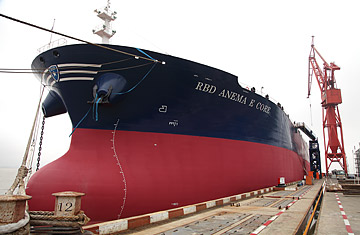
This undated handout picture released on July 26, 2011, by RBD Armatori in Italy shows the RBD Anema e Core Italian tanker, which was seized by pirates with a crew of 23 off Benin in the Gulf of Guinea on July 24
In late July, pirates stormed an Italian oil tanker, startling the 23 crew members guiding the ship toward its African port. But this was not another attack off the coast of Somalia, whose pirates have for years been the scourge of shipping lanes off its coast. The men who seized the Anema e Core work thousands of miles to the west, in the Gulf of Guinea.
In the past eight months, acts of piracy have spiked in the waters off West Africa, says John Drake, a senior consultant at the London-based security firm AKE. The wave of violence seems partly inspired by the Somali pirates and partly a result of the mixed blessings that come, countries in the region are finding out, with discovering vast oil reserves.
Piracy here is a combination of brazen criminality and vigilante redressing of economic imbalance. West Africa's waters are an oil-soaked frontier for downtrodden young men hailing from the lawless Niger Delta, the area of Nigeria that perhaps best exemplifies the widening gap between oil wealth and poverty. Many of the rebels are from fishing communities and need nothing but their small vessels and guns in a raid. Firearms are widely available around West Africa, particularly in the Delta.
The violence perpetuated against those sailing through the West's shipping channels is "much, much higher than in any other part of the world. The robbers and militants are abusing them quite a bit," says Cyrus Mody, manager of the London-based International Maritime Bureau, which monitors global pirate activity. "It's much higher than in East Africa or other areas where we see this crime being committed."
In the past two years, as has happened in Somalia, entire crews have been shot and killed, their gun-wielding assailants sneaking up on them in small fishing skiffs. Some sailors have been tied up, beaten with rifle butts and whipped with electrical cables. Last year, Mody says, pirates who had seized a ship panicked and shot crew members at random after an officer sounded an emergency alarm. Now the region is sounding its own.
Since January, the International Maritime Bureau has seen a sharp rise in the number of recorded pirate attacks in the Gulf of Guinea, a stretch of ocean that runs along the coastline of 12 countries, from Ghana to Angola. While in 2010 there were no acts of piracy off the coast of Benin, Sixteen attacks have taken place in its waters this year, including the hijack of the Anema e Core, whose crew escaped unharmed after intervention from Benin's navy. There have been six assaults off the coast of Nigeria, and three near the coast of West Africa's most stable country, Ghana. Mody says the number of attacks is underreported.
The sudden rise in West African piracy has prompted concerns that weak maritime security in the area could severely affect global oil, metal and agricultural markets, says Jonathan Wood, a security expert at London-based Control Risks, an international consultancy that advises businesses on operating in hazardous environments. Two of Africa's top producers, Nigeria and Angola, are nestled in the Gulf, and the U.S. is aiming to import 25% of its oil through West African shipping lanes by 2015. Recently London's Lloyd's Marketing Association placed Nigeria and Benin in the same risk category as Somalia.
Angry Niger Delta rebels have been attacking drilling platforms and refineries, seizing boats and kidnapping oil executives for years in their conflict with the government and, by extension, the Western oil companies who they feel have pillaged their land. "It's a murky set of motives, whether to generate political impact or generate ransom," Drake says. "The oil sector is an attractive sector because attacks against it can generate shock waves around the international community — everyone's watching it, particularly Nigeria. But militants also have the perception that oil companies have more money than other private companies, so they have more to invest in the local communities or to pay ransoms."
